新目标八年级英语上册 Unit 1 Where did you go on vacation section A(2a-2d)课件
八年级英语上册Unit1Wheredidyougoonvacation课件新版人教新目标版
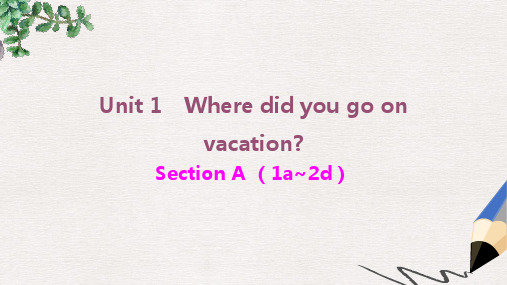
回我说过的话。
Take off your wet clothes. 脱下你的湿衣服。
【应用】
( C )1. Can I _____ of flowers? A. take off
B. take on
C. take photos
D. take back
要点梳理
( B )2. When I arrived at the airport, I saw my plane just _____. What a pity! A. take away B. take off C. took away D. took off 4 most的用法 【教材例句】I just stayed at home most of the time to read and relax. 我大部分时间只是待在家里看书和 放松。(教材第2页)
Unit 1 Where did you go on
vacation?
Section A (1a~2d)
课前导学
核心单词 1. _a_n_y_o_n_e__ pron. 任何人 2. __a_n_y_w_h_e_r_e___ adv. 在任何地方 3. __w__o_n_d_e_r_fu_l__ adj. 精彩的;绝妙的 4. ____f_e_w____ adj. & pron. 不多;很少 5. ___m__o_s_t __ adj., adv. & pron. 最多;大多数 6. __s_o_m__e_th_i_n_g__ pron. 某事;某物 7. __e_v_e_ry_o_n_e__ pron. 每人;人人;所有人
课前导学
3. We took quite a few photos there. _我__们__在__那_儿__拍__了__不__少_照__片__。______________________ 4. What about you? Did you do anything special last month? _你__呢_?__上__个__月__你_做__了__什__么__特_别__的__事__情__吗_?____________ 5. I just stayed at home most of the time to read and relax. _我__大_部__分__时__间__只_是__待__在__家__里_看__书__和__放__松_。____________
八年级新目标上unit_1_Where_did_you_go_on_vacation_知识点
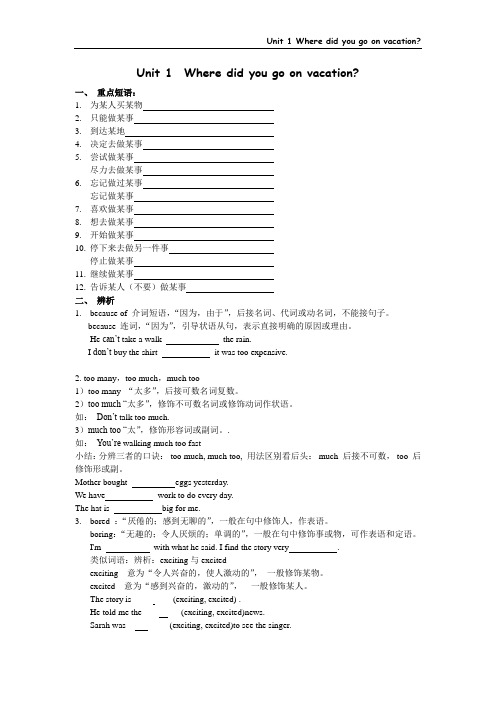
Unit 1 Where did you go on vacation?一、重点短语:1.为某人买某物2.只能做某事3.到达某地4.决定去做某事5.尝试做某事尽力去做某事6.忘记做过某事忘记做某事7.喜欢做某事8.想去做某事9.开始做某事10.停下来去做另一件事停止做某事11.继续做某事12.告诉某人(不要)做某事二、辨析1.because of 介词短语,“因为,由于”,后接名词、代词或动名词,不能接句子。
because 连词,“因为”,引导状语从句,表示直接明确的原因或理由。
He can’t take a walk the rain.I don’t buy the shirt it was too expensive.2. too many,too much,much too1)too many “太多”,后接可数名词复数。
2)too much “太多”,修饰不可数名词或修饰动词作状语。
如:Don’t talk too much.3)much too “太”,修饰形容词或副词。
.如:You’re walking much too fast小结:分辨三者的口诀:too much, much too, 用法区别看后头:much 后接不可数,too 后修饰形或副。
Mother bought eggs yesterday.We have work to do every day.The hat is big for me.3.bored :“厌倦的;感到无聊的”,一般在句中修饰人,作表语。
boring:“无趣的;令人厌烦的;单调的”,一般在句中修饰事或物,可作表语和定语。
I'm with what he said. I find the story very .类似词语:辨析:exciting与excitedexciting 意为“令人兴奋的,使人激动的”,一般修饰某物。
excited 意为“感到兴奋的,激动的”,一般修饰某人。
新目标英语八年级上册Unit 1Where did you go on vacation Section A grammar focus-3c
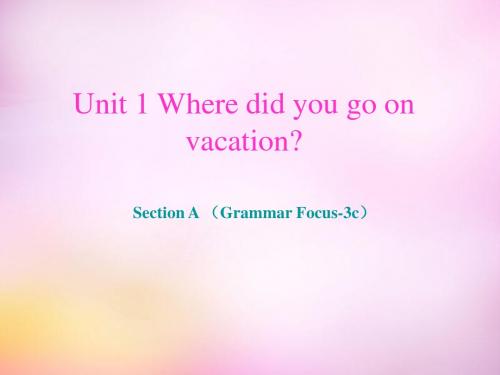
( B )1. I have ____ to tell you. A. anything interesting B. something interesting C. interesting anything D. interesting something ( B )2. --- What can you see in the basket? --- I can see _____. A. anything B. nothing C. everything ( C )3. The light in the room is still on, I think ____ is in the room. A. everyone B. anyone C. someone ( D )4. The work is very easy, I can do it by ____. A. me B. my C. mine D. myself ( A )5. The TV show is very ____, and I feel ____. A. boring, bored B. boring, boring C. bored, bored D. bored, boring ( C )6. He seems ____ after hard work. A. to tired B. tired C. to be tired ( A )7. --- Can you help me with my English? ---____. A. Of course B. You are welcome C. That's for sure.
八年级英语上册 unit 1 where did you go on vacation(短语+句型+练习)(新版)人教新目标版
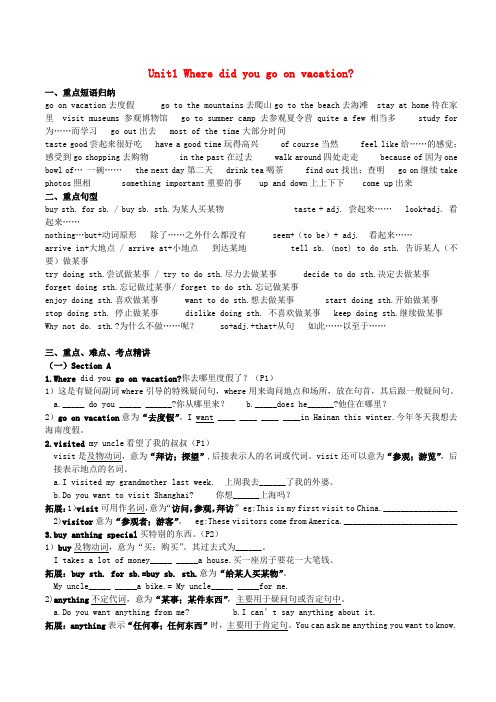
Unit1 Where did you go on vacation?一、重点短语归纳go on vacation去度假 go to the mountains去爬山go to the beach去海滩 stay at home待在家里 visit museums 参观博物馆 go to summer camp去参观夏令营quite a few相当多 study for 为……而学习 go out出去 most of the time大部分时间taste good尝起来很好吃 have a good time玩得高兴 of course当然 feel like给……的感觉;感受到go shopping去购物 in the past在过去 walk around四处走走 because of因为one bowl of…一碗…… the next day第二天 drink tea喝茶 find out找出;查明 go on继续take photos照相 something important重要的事 up and down上上下下 come up出来二、重点句型buy sth. for sb. / buy sb. sth.为某人买某物 taste + adj. 尝起来…… look+adj. 看起来……nothing…but+动词原形除了……之外什么都没有 seem+(to be)+ adj. 看起来……arrive in+大地点 / arrive at+小地点到达某地 tell sb. (not) to do sth. 告诉某人(不要)做某事try doing sth.尝试做某事 / try to do sth.尽力去做某事 decide to do sth.决定去做某事forget doing sth.忘记做过某事/ forget to do sth.忘记做某事enjoy doing sth.喜欢做某事 want to do sth.想去做某事 start doing sth.开始做某事stop doing sth. 停止做某事 dislike doing sth. 不喜欢做某事 keep doing sth.继续做某事Why not do. sth.?为什么不做……呢? so+adj.+that+从句如此……以至于……三、重点、难点、考点精讲(一)Section A1.Where did you go on vacation?你去哪里度假了?(P1)1)这是有疑问副词where引导的特殊疑问句,where用来询问地点和场所,放在句首,其后跟一般疑问句。
人教版新目标八年级英语上册课文翻译
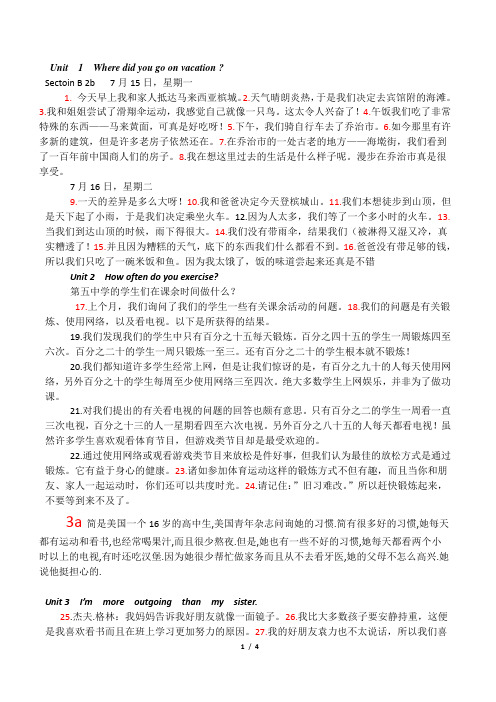
Unit 1 Where did you go on vacation ?Sectoin B 2b 7月15日,星期一1.今天早上我和家人抵达马来西亚槟城。
2.天气晴朗炎热,于是我们决定去宾馆附的海滩。
3.我和姐姐尝试了滑翔伞运动,我感觉自己就像一只鸟。
这太令人兴奋了!4.午饭我们吃了非常特殊的东西——马来黄面,可真是好吃呀!5.下午,我们骑自行车去了乔治市。
6.如今那里有许多新的建筑,但是许多老房子依然还在。
7.在乔治市的一处古老的地方——海墘街,我们看到了一百年前中国商人们的房子。
8.我在想这里过去的生活是什么样子呢。
漫步在乔治市真是很享受。
7月16日,星期二9.一天的差异是多么大呀!10.我和爸爸决定今天登槟城山。
11.我们本想徒步到山顶,但是天下起了小雨,于是我们决定乘坐火车。
12.因为人太多,我们等了一个多小时的火车。
13.当我们到达山顶的时候,雨下得很大。
14.我们没有带雨伞,结果我们(被淋得又湿又冷,真实糟透了!15.并且因为糟糕的天气,底下的东西我们什么都看不到。
16.爸爸没有带足够的钱,所以我们只吃了一碗米饭和鱼。
因为我太饿了,饭的味道尝起来还真是不错Unit 2 How often do you exercise?第五中学的学生们在课余时间做什么?17.上个月,我们询问了我们的学生一些有关课余活动的问题。
18.我们的问题是有关锻炼、使用网络,以及看电视。
以下是所获得的结果。
19.我们发现我们的学生中只有百分之十五每天锻炼。
百分之四十五的学生一周锻炼四至六次。
百分之二十的学生一周只锻炼一至三。
还有百分之二十的学生根本就不锻炼!20.我们都知道许多学生经常上网,但是让我们惊讶的是,有百分之九十的人每天使用网络,另外百分之十的学生每周至少使用网络三至四次。
绝大多数学生上网娱乐,并非为了做功课。
21.对我们提出的有关看电视的问题的回答也颇有意思。
只有百分之二的学生一周看一直三次电视,百分之十三的人一星期看四至六次电视。
新目标版八年级英语上册:Unit-1-where-did-you-go-on-vacation全单元

Unit1 where did you go on vacation?(Section A 1a—1c)预习检测:1.写出下列动词的过去式:go _______________ stop ___________________ visit _____________study____________do __________ride____________ take_____________ drive__________ arrive___________walk______________________ sleep ___________keep___________ get___________ 2.翻译下列短语:参加夏令营______________________________ 去大山________________________________去海滩_______________________________参观博物馆________________________________呆在家_______________________________ 拜访我的叔叔_____________________________任何特殊的事情_______________________________外出______________________________语法回顾:动词过去式构成规则用词的正确形式填空1.I _________( like ) oranges when I was young(年轻的).But now I __________(not like)them.2. My mother often _________( stay) at home on Sundays, but last Sunday she_________( not stay) at home ,she _________(go) to the park.3. Wei Hua __________ (have)a busy day yesterday.4.He ___________(visit) the Great Wall(长城)last year.5.We____________(have) a good time yesterday.6.We often __________(go) to school by bus last year.7.I __________(live)in the village when I was a child.9.Mike__________(see) a big tiger in the park last year.10.Sam___________ (do) the housework yesterday.11.________(do) you _________(enjoy) yourself yesterday?12.________(do)you __________(play) the violin in the art room yesterday?No, I didn't. I___________(draw)some pictures there.选择填空( ) 1. She watered the flowers _____. A tomorrow B sometimes C yesterday morning( ) 2.What ____ Mike do last weekend ? A do B does C did( ) 3. I ___ my room last Sunday. A cleaned B clean C am cleaning( ) 4. I often help my mother _____ housework. A does B did C do( ) 5. _____ you _____ TV last night. A Do, watch B Did, watch C Did, watched( ) 6. Did your father write an e-mail yesterday? A Yes, he did. B Yes, he does C No, he don’t( ) 7.They _____ on a trip in February ,2007. A are going B going C went( ) 8.We’re going to _____mountains tomorrow. A climb B climbed C climbing( ) 9. ____ he ____ football two days ago? A Does , play B Did , played C Did , play( ) 10.Good afternoon, Miss Lee. How does Mike feel? He’s tired . He ____ a lot of work ______ .A does , this morningB do , this morningC did , this mornUnit1 where did you go on vacation?(Section A 2a—3c)小试牛刀:1. - --Do you have ____________ to eat? (anything /something)---No, I don’t have ________________to eat. (anything /something)2. Would you like ____________ to eat? (anything /something) –Yes, please.3. Something _______(is/ are /am) wrong with my watch.4. There is ___________(something interesting / interesting something) in the news paper.五、反馈检测:(一)汉译英:1上个月_________________ 2.瀑布______________ 3.相当多_________________4.拍照/照相_________________5.大多数时间_________________6.第一次_________________.7.认为,思考________________8.很久没有见面!______________________________________9.那是我第一次去三亚。
(人教版)2020八年级英语上册 Unit 1 Where did you go on vacation讲义+习题 (新版)人教新目标版

Unit1. Where did you go on vacation因为19.one bowl of… 一碗…… 20.the next day 第二天21.drink tea喝茶22.find out找出;查明23.go on继续24.take photos照相25.something important重要的事 26.up and down上上下下27.have a good time玩得高兴=enjoy oneself=have (great) fun1.与seem有关的句式1)seem + 形容词“看起来…..” You seem happy today.2)seem + to do sth. “似乎、好像做某事” I seem to have a cold3)It seems / seemed + 从句“看起来好像…;似乎…”. It seems that no one believe you.4)seem like ….“好像,似乎…..” It seems like a good idea.2. too many,too much,much too1)too many “太多”,后接可数名词复数。
如:Mother bought too many eggs yesterday.2)too much “太多”,修饰不可数名词或修饰动词作状语。
如:3)much too “太”,修饰形容词或副词。
如:小结:分辨三者的口诀: too much, much too, 用法区别看后头: much 后接不可数, too 后修饰形或副。
too many 要记住,后面名词必复数。
7. because:1)because of 介词短语,“因为,由于”,后接名词、代词或动名词,不能接句子。
如:H e can’t take a walk because of the rain.2)because 连词,“因为”,引导状语从句,表示直接明确的原因或理由。
人教新目标八年级英语上册Unit1Wheredidyougoonvacation知识点讲解
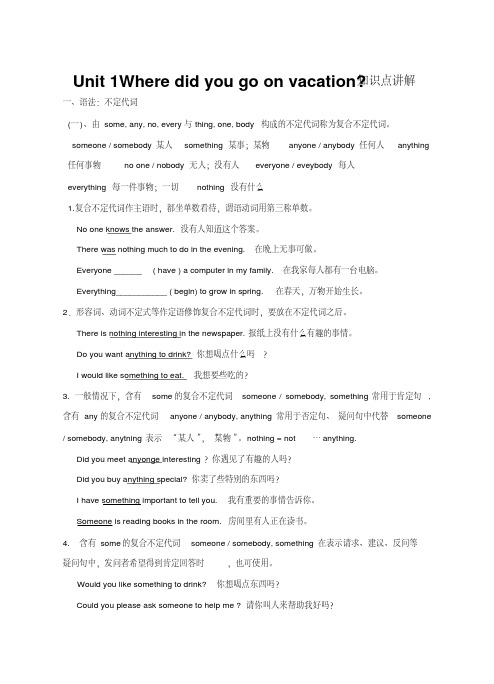
Unit 1Where did you go on vacation?知识点讲解一、语法:不定代词(一)、由some, any, no, every与thing, one, body 构成的不定代词称为复合不定代词。
someone / somebody 某人something 某事;某物anyone / anybody 任何人anything 任何事物no one / nobody 无人;没有人everyone / eveybody 每人everything 每一件事物;一切nothing 没有什么1.复合不定代词作主语时,都坐单数看待,谓语动词用第三称单数。
No one knows the answer. 没有人知道这个答案。
There was nothing much to do in the evening. 在晚上无事可做。
Everyone ______ ( have ) a computer in my family. 在我家每人都有一台电脑。
Everything___________ ( begin) to grow in spring. 在春天,万物开始生长。
2.形容词、动词不定式等作定语修饰复合不定代词时,要放在不定代词之后。
There is nothing interesting in the newspaper.报纸上没有什么有趣的事情。
Do you want anything to drink?你想喝点什么吗?I would like something to eat. 我想要些吃的?3. 一般情况下,含有some的复合不定代词someone / somebody, something常用于肯定句,含有any的复合不定代词anyone / anybody, anything常用于否定句、疑问句中代替someone / somebody, anytning表示“ 某人”,“某物”。
最新人教新目标英语八年级上册 Unit 1 Where did you go on vacation?单元知识归纳

Unit 1 Where did you go on vacation?单元知识目标突破词汇SectionAanyone pron.任何人→P3SectionBfeel like给……的感觉;感受到→P10quite a few 相当多;不少→P3building n.建筑物;房子→P10wonder v. 想知道;琢磨→P11most adj.,adv. &pron. 最多;大多数→P4difference n.差别;差异→P11wait v.&n. 等待;等候→P12 seem v. 好像;似乎;看来→P4because of 因为→P12bored adj. 厌倦的;烦闷的→P5below prep.&adv. 在……下面;到……下面→P13SectionBactivity n. 活动→P9enough adj. 足够的;充足的;充分的→P13 decide v. 决定;选定→P9try v.& n. 尝试;设法;努力→P9dislike v.&n.不喜爱;厌恶→P14把握句型1.I felt like I was a bird.我感觉像是一只鸟。
feel like后接的是宾语从句。
2.I wonder what life was likehere in the past.我很想知道过去这儿的生活是什么样的。
注意wonder的用法。
3.What a difference a day makes!一天的差别有多大!注意感叹句。
4.And because of the badweather,we couldn't seeanything below.因为这恶劣天气,我们看不到下面的任何景色。
注意because of的运用。
熟悉语法学习不定代词的用法。
规则动词和不规则动词的过去式。
学会交际学会询问度假情况的交际用语。
写作练笔记叙假期发生的事情。
课文翻译Section A 2dRick:Hi,Helen. Long time no see.Helen:Hi,Rick. Yes,I was on vacation last month.Rick:Oh,did you go anywhere interesting?Helen:Yes,I went to Guizhou with my family.Rick:Wow!Did you see Huangguoshu Waterfall?Helen:Yes,I did. It was wonderful!①We took quite a few photos there. What about you?Did you do anything special last month?Rick:Not really.②I just stayed at home most of the time to read and relax.,里克:你好,海伦。
八年级英语上册Unit 1 Where did you go on vacation《必备知识清单》

11. Of course! (P. 3)
of course意为“当然”,相当于sure或者certainly。
-May I borrow your dictionary? -Of course!
只修饰可数名词的量词有:a few, few, several, many, too many, a number of
既可以修饰不可数名词也可以修饰可数名词的量词有:some, any, a lot of, lots of, plenty of
7. I wonder what life was like here in the past. (P. 5)
feel like doing sth.=would like to do sth.=want to do sth.
Do you feel like going out for a walk with me?
=Would you like to go out for a walk with me?
=Do you want to go out for a walk with me?
enjoy用作及物动词,表示“喜欢”,后接名词、代词或者动名词作宾语。
Do you enjoy music?
I don’t enjoy sleeping with the window open.
9. What a difference a day makes! (P. 5)
本句是what引导的感叹句,what引导的感叹句常用的结构有:“What+a/an+形容词+单数可数名词+主语+谓语”或者“What+形容词+可数名词复数/不可数名词+主语+谓语”。
人教新目标八年级上册英语《Unit 1 Where did you go on vacation?》

人教新目标八年级上册英语《Unit 1 Where did you go on vacation?》Section B_教学设计1一. 教材分析人教新目标八年级上册英语《Unit 1 Where did you go on vacation?》Section B 主要讲述了假期旅行的主题。
通过本节课的学习,学生能够掌握一般过去时的疑问句和回答,以及如何描述过去发生的事情。
教材内容贴近学生的生活,激发学生对旅行的兴趣,提高学生的口头表达能力。
二. 学情分析八年级的学生已经掌握了基本的英语语法知识,具有一般现在时和一般过去时的基础。
在学习本节课之前,学生已经学习了如何用英语描述家庭成员和询问他们的去向。
因此,学生在学习本节课时,能够将已有的知识与新的知识相结合,提高学习效果。
三. 教学目标1.知识目标:–能够听懂、说出一般过去时的疑问句和回答。
–能够用英语描述过去发生的事情。
2.能力目标:–能够与他人用英语交流关于假期旅行的经历。
–能够提高口头表达能力。
3.情感目标:–激发学生对旅行的兴趣,拓宽视野。
–培养学生的团队协作精神。
四. 教学重难点•一般过去时的疑问句和回答。
•如何用英语描述过去发生的事情。
•一般过去时疑问句的构成和用法。
•如何在实际交流中运用一般过去时。
五. 教学方法1.情境教学法:通过设置旅行相关的情境,让学生在实际语境中学习英语。
2.交际法:鼓励学生参与课堂互动,提高学生的口头表达能力。
3.任务型教学法:通过小组合作完成任务,培养学生的团队协作精神。
六. 教学准备1.教学课件:制作与旅行相关的课件,包括图片、视频等。
2.教学道具:准备一些与旅行相关的实物道具,如地图、行李箱等。
3.小组活动准备:划分学习小组,提前分配任务。
七. 教学过程1.导入(5分钟)–教师展示一张旅行图片,引导学生谈论旅行的话题。
–学生分享自己最喜欢的旅行地点和经历。
2.呈现(10分钟)–教师通过课件呈现一般过去时的疑问句和回答。
人教新目标八年级英语上册Unit 1 Where did you go on vacation单元主题写作课件
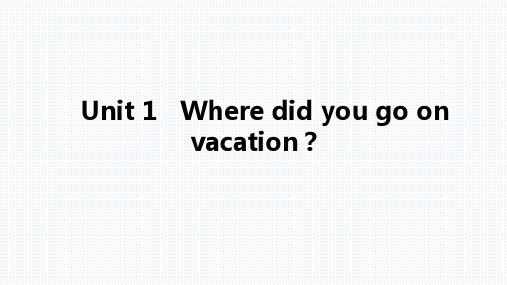
5.享用海鲜________________ enjoy seafood
单元主题写作一
常用句子
1.I went to the mountains with my family. 2.Although I was tired, I had a good time. 3.We went to the beach and played beach volleyball. 4.We did something special and had great fun. 5.We went somewhere interesting and took a lot of photos.
单元主题写作一,恰当地使用连接词,
如:first, then, after that, at last等,使文章更有逻辑性。
②句子“I felt like I was a fish.”的使用使文章更加生动形象。
③结尾扣题,总结感受,表达愿望。
单元主题写作一
Unit 1 Where did you go on vacation?
Unit 1 Where did you go on vacation?
单元主题写作一
单元主题写作一
话题分析
本单元以“介绍某次旅行经历”为话题,以书信或日记的
格式描述自己的某次旅行经历,介绍自己旅行经历中的所见、
所闻、所感、所想。
单元主题写作一
3.段落间和句子间使用恰当的连词。
单元主题写作一
素材积累
常用短语 go boating 1.去划船________________ play beach volleyball 2.打沙滩排球________________ go swimming 3.去游泳________________ have a good time/enjoy oneself 4.玩得愉快________________________
人教版新目标版八年级英语上册Unit 1 Where did you go on vacation教案

《Unit 1 Where did you go on vacation》一.教学目标(teaching aims)1)知识目标(knowledge aims)1.掌握本单元的重点单词:anyone, anywhere, wonderful, few, most, decide, try,difference…2.掌握本单元的重点短语:go to summer camp, go out, qu ite a few, most of time…3.掌握本单元的重点句型:a.Where did you go on vacation?b.Did you do anything special last month?c.Long time no see.d.I just stayed at home most of time to read and relax.2)能力目标(abilities aims)1.听能目标: 关于“旅游(holiday)和度假(vacation)的听力训练。
2.说能目标:能够流利的谈论“度假”3.写能目标:能够写一篇关于旅行的文章。
3)过程与方法目标(process and method aims)借助图片与对话反复操练“Where did you go on vacation?”这个句型。
4)情感态度与价值观通过谈论假期生活,使学生加强交流.沟通,并学会劳逸结合,更好的投入到学习当中。
二.教学工具多媒体,录音机三.教学重难点教学重点:1)熟练掌握本单元的重点单词、句型2)不定代词及一般过去时的用法教学难点:熟练运用一般过去时和不定代词四.教学过程(teaching proceduces)Section AStep1. 课前预习(1)教师通过师生自由交流,导入本节课的话题。
T: What did you do on vacation?S: I went hiking…T:Where did you go on vacation?S: I went to the mountains…(2) Match the picture 1aStep2 课堂呈现1)Where did you go on vacation?on vacation 意为“在度假,在假期中”eg She is on vacation now.vacation(n、)意为“假期,休假”go on vacation 去度假take a vacation at/in 在……度假2)…go with anyone?……和别人去的吗?anyone 不定代词,相当于anybody.用于肯定句当中,意为“任何人”,用于否定句和疑问句中时,意为“有人”,作主语时,谓语动词用单数形式。
最新人教新目标英语八年级上册 Unit 1 Where did you go on vacation?教案2
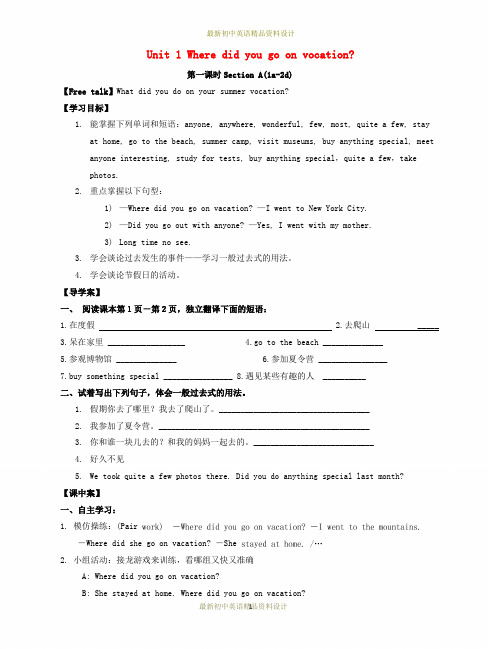
Unit 1 Where did you go on vocation?第一课时Section A(1a-2d)【Free talk】What did you do on your summer vocation?【学习目标】1.能掌握下列单词和短语:anyone, anywhere, wonderful, few, most, quite a few, stayat home, go to the beach, summer camp, visit museums, buy anything special, meetanyone interesting, study for tests, buy anything special,quite a few,takephotos.2.重点掌握以下句型:1)—Where did you go on vacation? —I went to New York City.2)—Did you go out with anyone? —Yes, I went with my mother.3)Long time no see.3.学会谈论过去发生的事件——学习一般过去式的用法。
4.学会谈论节假日的活动。
【导学案】一、阅读课本第1页-第2页,独立翻译下面的短语:1.在度假2.去爬山 _____3.呆在家里 __________________4.go to the beach ______________5.参观博物馆 ______________6.参加夏令营 ________________7.buy something special ________________ 8.遇见某些有趣的人 __________二、试着写出下列句子,体会一般过去式的用法。
1.假期你去了哪里?我去了爬山了。
___________________________________2.我参加了夏令营。
新目标英语八年级上册Unit1-where-did-you-go-on-vacation
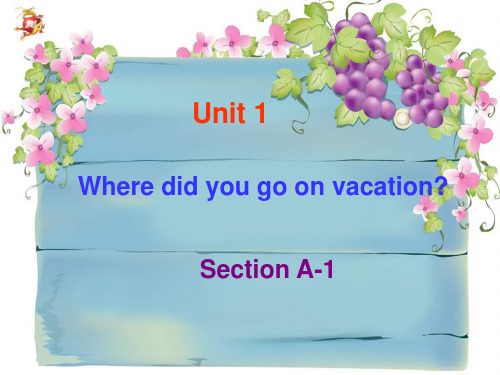
Where did he go on vacation? He visited museums.
Where did they go on vacation? They went to summer camp.
They went to the mountains. They went to the beach.
1. 在英语中,anything, something, nothing和
everything是用于指代事物的复合不定代词,与之 相对应的复合不定代词anyone, someone, no one和 everyone (anybody, somebody, nobody和everybody) 用于指人。与形容词连用时,形容词必须置于复合 不定词之后,语法上称作“后置”。
There is nothing wrong with the TV. Everybody likes to be free.
Notes
(3)some-不定代词,通常用于肯定句中;any-不定代 词则多用于否定句、疑问句和条件状语从句中。 但some-可用于表请求、邀请、预料对方会作肯定回答 时的疑问句中。 Someone called on her last week. There isn’t anyone else there. Is anybody over there? Could you give me something to eat? (4)形容词修饰不定代词时,通常要放在不定代词之后。 There is something wrong with your eyes.
事情) about your vacation, Jenny.
4. They caught _q__u_it_e_ _a__ _fe_w__ (相当多的) insects in the forest.
新课标八年级英语上册unit1_Where_did_you_go_on_vacation_第二课时
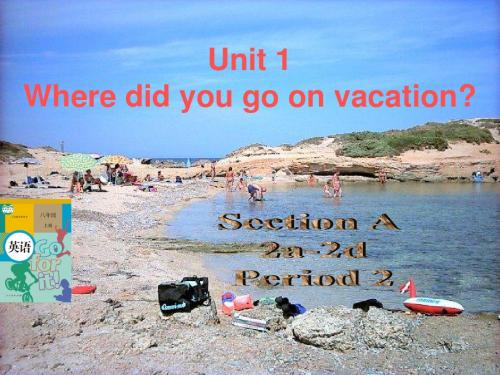
Language Points
1.Where did you go on vacation? 你去哪儿度假了? 1)结构:where do Sb+ v ? Bob在哪踢足球? Where does Bob play football ? where be +… ? Bob 在哪? Where is Bob ?
go to the beach 去海滩 go to the mountains 去爬山 待在家里 stay at home 看望叔叔 visit uncle 去度假 go on vacation 参观博物馆 visit museums 去参加夏 go to summer camp
令营
Did Xiang Hua go to summer camp on vacation? No, he didn’t.
√ √ √
√ √nversations between Grace,
Kevin and Julie. A: Grace, where did you go on vacation? B: I went to New York City. A: Oh, really? Did you go with anyone? B: Yes, I went with my mother.
I can see someone new in your group. 我看出你们小组里有新人。
There’s nothing interesting in the news 今天的新闻里没有什么有趣的新闻。
6. We took quite a few photos there. quite a few“相当多”, 修饰可数名词,请 不要与a few(少数几个) 混淆。比较句中 quite a few 和a few的区别。
- 1、下载文档前请自行甄别文档内容的完整性,平台不提供额外的编辑、内容补充、找答案等附加服务。
- 2、"仅部分预览"的文档,不可在线预览部分如存在完整性等问题,可反馈申请退款(可完整预览的文档不适用该条件!)。
- 3、如文档侵犯您的权益,请联系客服反馈,我们会尽快为您处理(人工客服工作时间:9:00-18:30)。
பைடு நூலகம்
4) 你见过有趣的人吗? Did you meet anyone interesting?
anyone 表示“某人”时,常用于否定句和疑问句中,意为
(
B )2. I don't want to go to the mountains with ____ next
A. someone C. anything
(
B )3. --- Can you tell me about it?
--- Sorry, I don't have ___ to tell you, I am new here, too. A. something A. with B. anything B. at C. in C. everything D. for
( A ) 4. I often study for tests ____ my sister.
2d
Role-play conversations
2d
Read and Answer.
1). When was Helen on vacation? 2). Wheren did Helen go?
3). Is Huangguoshu Waterfall in Guizhou?
Listen. Where did Nancy, Kevin, and Julie go
2a
on vacation? Match the person with the place .
New York City
the beach home
2b
Listen again. For each question check (√ ) “Yes , I did .” or “No , I didn’t.” as you hear them talk .
Did you do anything special last month? ____________________________________________
1. anyone 的用法
1) 有谁去过山区吗?Did anyone go to the mountains?
2) 我不想告诉任何人这件事。
( B )2. I am very busy these days, so I can't go ___ with you.
A. somewhere 3. 好长时间不见了。 Long time no see. ____________________________________________ 4.我们在那里照了很多照片。 We took quite a few photos there. ____________________________________________ 5. 上个月你做了一些特殊的事情吗? B. anywhere C. everywhere
4). Did Rick do anything special last minth? What did he do?
Role-play conversations
( B ) 1. I ___ on vacation last month. A. did B. was C. were D. do
Unit 1 Where did you go on vacation?
Section A (2a-2d)
T: Ss: T: Ss: T: Ss: T: Ss: ... ...
Did you have a good summer vacation? Yes, I did. Where did you go on vacation? I went to the mountains./ I went to ... Who did you go with? I went there with my parents./friends./... Did you buy anything special? Yes, I did. I bought .../ No, I didn't.
“什么人,谁”;表示 “任何人”,可用于肯定句。被形容词
修饰时,形容词应该置于其后。
2. anywhere 的用法
1) 我在什么地方都不能找到它。I can't find it anywhere. 2) 昨晚你去什么地方了吗? Did you go anywhere last night? 3) 你去过又去的地方吗? Did you go to anywhere interesting? 4) 随便坐。 Sit anywhere.
few 用来修饰可数名词的复数,表示否(肯或否)定意思, “没有,几乎没有 ”; 常用词组为 a few, 表示肯定意思, 意 为 “有几个”。 与 few 和 a few 相对应的是 little 和 a little, 用 来修饰不可数名词, little 表示否定意思,意为 “没有,几乎 没有”。 a little 表示肯定意思,意为 “ 有一点”。
anywhere 表示 “某地” 时,常用于否定句和疑问句中,意 为 “在(往)什么地方,在(往)任何地方”;被形容词修饰 时,形容词应该置于其后。表示 “在任何地方”,可用于肯定 句。
3. few 的用法
1) 他在这里几乎没朋友。He has few friends here.
2) 篮子里有几个鸡蛋。There are a few eggs in the basket.
2c
Role-play conversations between Grace, Kevin and Julie.
(
B )1. --- Did you go to Central Park?
--- _____ A. Yes, I didn't C. No, I did B. Yes, I did D. Yes, I do month. B. anyone D. anywhere
